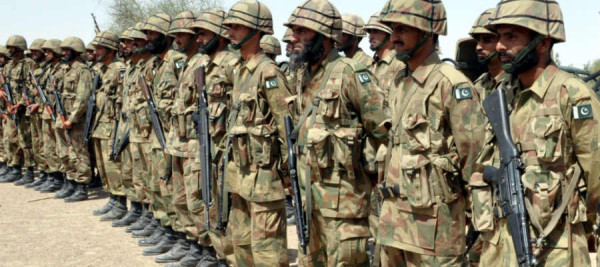BY RSN SINGH
The Pakistan military has abundantly demonstrated that it cannot abandon the jihadi outfits till it amalgamates India’s Jammu & Kashmir and till it imposes its own regime in Kabul in perpetuity. Hence the Pakistan government may have no status or influence in country’s foreign policy but for the Pakistan military the jihadi tanzims are an important strategic component.
We have provided the proof on Pathankot attack. It is clinching. The US and the NATO countries seem to be more than convinced. Call records, DNA samples, voice samples have been given to the Pakistan team. But how does DNA sample matter to a country without any DNA. Pakistan probably believes that there is no proof unless you catch a Pakistani jihadi alive and it is no proof even if you catch someone alive like Ajmal Kasab.
We know the wont of Pakistan. The world knows the wont of Pakistan. We delude ourselves not with any hope but because we live in a damn international system, which boasts of functioning under rules and parameters, but certainly not on merit and justice. The prevailing world order thrives on hypocrisy. India has no choice but to navigate through it.
The powers that be are worried about nuclear weapons in the hands of jihadis, primarily because that endangers them too. In this regard, Pakistan is their biggest rather their only suspect and concern. As long as Pakistan exists in its present mould, the danger would fester. Hence, there is a need to defang Pakistan off its nuclear weapons.
It was a forgone conclusion that the Nuclear Security Summit at Washington held in the first week of April was to be overwhelmingly focused on Pakistan. Accordingly, the Pakistan military, the custodian of nuclear weapons, suffering from prosecution complex, made it impossible for Nawaz Sharif to go for the Summit. Nawaz is the Prime Minister of Pakistan and like all other prime ministers he has little control over Pakistan’s nuclear weapons programme. The attack on Pathankot airbase therefore was with the objective of sabotaging his participation in the Summit. The military’s facade of sharing Pathankot intelligence was to win the goodwill of US and its allies before the Summit. It was a ploy to buy temporary reprieve. Its aim was to take the sting out of the global concern about the insecurity and proliferation aspects of Pakistan’s nuclear weapons. Having lulled Nawaz Sharif and the US in run-up to the Summit, the Pakistan military then pulled the rug under the feet of Nawaz Sharif by conjuring Kulbhushan Jadhav and back tracking on the investigation after the visit of Joint Investigation Team (JIT) to Pathankot.
It cost nothing to the military-intelligence establishment in unleashing the Jaish-e-Mohammad (JeM) cadres on Pathankot. All jihadi tanzims including the JeM are part of the ‘Jihadi-Narco-Terror Network’. They sustain on drug money and have cross border operatives and beneficiaries including in the security establishment.
As per the script, when the moment arrived of proscribing the JeM, the Chinese used their Veto power to salvage Pakistan and redeem Maulana Masood Azhar.
The preferential treatment to JeM or say mollycoddling of Masood Azhar, a Punjabi, incited the Tahreek-e-Taliban Pakistan (TTP) comprising mainly Pashtuns to subject Iqbal Park in Lahore to suicide attack in which more than 70 people were killed including women and children. The TTP has mainly been bearing the onslaught of the Pakistan Army all over the country including in FATA where operation Zarb-e-Azb has rendered thousands homeless and has orphaned countless children. The blow back in Punjab was thus expected. The JIT drama thus cost Pakistan heavily.
Pakistan, particularly the military is a prisoner of its own jihadi agenda. Jihadi organizations have ensured that India-Pakistan enmity is effectively translated into ‘Hindu versus Muslim’ narrative. Jihad inherently has global designs; it cannot be confined against one country. It is for this reason that many jihadi outfits have rebelled against the narrow narrative of Pakistan military and turned hostile to the Pakistan State. They have refused to be slaves of ‘Pakistan versus India’ or ‘Pakistan versus Afghan government’ agenda. The ISIS therefore has great future in Pakistan or may be even the Indian Subcontinent.
Masood Azhar and Hafiz Saeed are basically global jihadis. The latest reports based on the archival research of the BBC reveal that Azhar had extensively toured UK in 1993. He delivered some 40 speeches in different mosques, predominantly Deobandi. It may be mentioned that more than 40 percent of mosques in Britain are under the control of Deobandis. The report suggests that Azhar was the first to fan the ideology of modern jihadist militancy in Britain.
A serious question emerges why did China, tormented by Uighur jihadists in Xinjiang and has recently banned burqas in the capital city of Urmuqi come to the aid of JeM and Pakistan by using its Veto (1:14). Plausibly there are two reasons, i.e. first, the Chinese would like to keep India unsettled through Pak jihadi outfits, as it makes strategic thrust through Pakistan Occupied Kashmir (POK) and all the way to Gwadar port through Pakistan’s longer axis by way of China-Pakistan Economic Corridor (CPEC). Secondly, both Pakistan and China need the goodwill and indulgence of Punjab based militant groups for security of the CPEC. Amongst the highway networks envisaged for the CPEC, the stretch between Lahore and Karachi has been designated as a ‘priority project’, while the Eastern highway Abbottabad – Quetta (linking finally to Gwadar port) has been designated a ‘short term project’. The Lahore-Karachi segment passes close to Bahawalpur area, which is under the influence of JeM. No one should underestimate the influence of these jihadi groups in Punjab. It has recently been in evidenced after the massive outpour of support after the hanging of Mumtaz Qadri, killer of former Punjab Governor Salmaan Tasir, and the popularity of parallel Shariat courts run by Hafiz Saeed’s JuD.
In the international fora, ignominy is not new to Pakistan. Nevertheless, the latitude to Pakistan by the US and its allies, notwithstanding the exigencies in Afghanistan, is inexplicable. China on the other hand is known for pursuing its strategic agenda and foreign policy objectives though rouge states like North Korea. Pakistan in China’s reckoning belongs to the same category. As long as jihadi outfits thrive, Pakistan will continue to be the rouge and the client state that China desires.
The Pakistan military has abundantly demonstrated that it cannot abandon the jihadi outfits till it amalgamates India’s J&K and till it imposes its own regime in Kabul in perpetuity. Hence the Pakistan government may have no status or influence in country’s foreign policy but for the Pakistan military the jihadi tanzims are an important strategic component.
Prime Minister Narendra Modi’s so called ‘impromptu’ visit to Pakistan was one way by Nawaz Sharif to make a serious bid to claim his legitimate role in determining the foreign policy of the country. The battle is on.
The disconnect between the government and the Pakistan military has cast dark shadows over Pakistan’s nation-state status. The Army is controlling Karachi, it is bombing FATA, it is facing insurgency in Baluchistan, it is deployed in parts of Khyber Pakhtunkhwa, and now after JIT affair in Punjab, which with 50 percent of the population and 70 percent of the Army is the heart of Pakistan. Never in the history of Pakistan has the Army been so bedeviled internally. Never before has it been so stretched. It is unable to cope up the blowback of jihad against India and Afghanistan. 61 hangings by the military courts in Pakistan have not given any respite from the blowback.
It is not in India’s interest in containing the blowback jihad or makes things easy for Pakistan’s military. The JIT affair had in consequence triggered the most devastating blowback in Iqbal Park in Lahore.
Khaled Ahmed, a respected Pakistan columnist, earlier in Pakistan’s Foreign Service had a decade earlier observed: “Pakistan is falling, because it is a warrior state and is not supposed to last. It is wedded to the ideal of war in which ideological rulers accept the possibility of annihilation (Shahddat), as a consequence of righteous war.”
(RSN Singh is a former military intelligence officer who later served in the Research & Analysis Wing. The author of two books: Asian Strategic and Military Perspective and Military Factor in Pakistan, he is also a Guest Blogger with Canary Trap. The opinions expressed by the author and those providing comments are theirs alone, and do not reflect the opinions of Canary Trap or any employee thereof)


One response to “Pakistan being killed by its military”
Also there is growing animosity against the force for being involved in every business. International pressure to hand over authority to civilian GOVT is high and it is having ripples in pak’s educated class which demands civilian authority.. As India demonstrates that it is willing to cooperate and not the enemy the army potrays, there will be rift in society which loses the significance of the army. As that happens a civil disobedience shall follow in coming 3 decades.